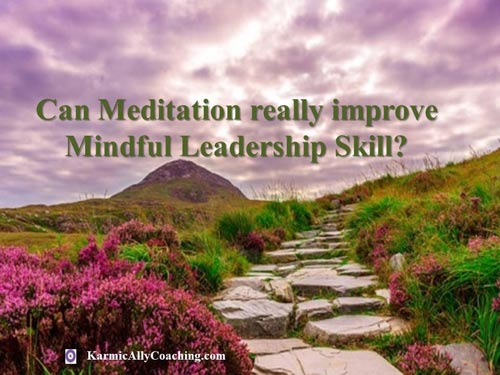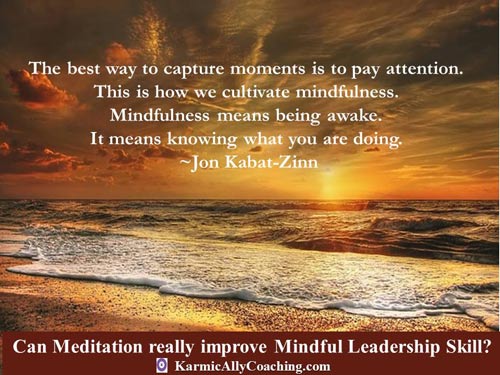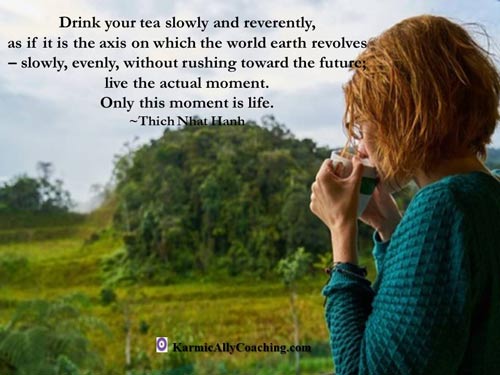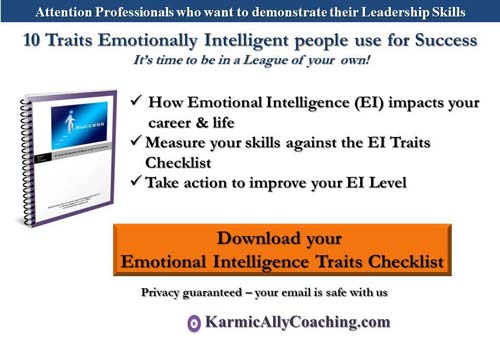This post has already been read 2677 times!

Does the phrase Mindful Leadership make you visualize a professional in an executive suit sitting cross-legged on the ground, eyes shut, chanting away in search of solutions for his team and organization?
I won’t be surprised if you answered yes. Many of us confuse mindfulness enhancing activities with meditation and similar Eastern practices.
Mindfulness is more than that. It is the end product of these practices providing us with the ability to be aware of both ourselves and our environment.
Put simply, mindfulness is the ability to see with clarity, free from habitual ways of thinking and reacting. The ability to see clearly on demand can be enhanced by cultivating attention in a non-judgmental way, insight, and skillful actions that create conditions to support mindfulness in everyday activities.
Mindfulness is about actively paying attention to what is actually happening in the moment, in order to respond with integrity and thus remain focused on our strategic results.
This enhances our ability to succeed in today’s ever more dynamic and complex world.

One of the best ways to develop the skill of mindfulness is indeed through the habit of meditation.
It should not come as a surprise that many corporate mindfulness training programs incorporate this technique and its variants to improve executive self-awareness, focus, ability to manage stress and other emotional intelligence skills that we need to cope with the changing corporate environment.
I’m a strong advocate of meditation for building resilience, stress management and improved focus, I benefited greatly from it during my accounting trainee days in London while holding down a full-time job and preparing for some of the world’s most difficult examinations.
I admit I was the butt of many a joke and playful ribbing, when I would use my lunch break to close my eyes for 20 minutes. My colleagues teased me about my ‘Om’ sessions.
Perhaps I should have told them I was taking a Power Nap like FDR instead. It doesn’t matter because they could see the difference in me and my high energy levels and focus.
20 years later, a study by J.C. Arias The effects of meditation on executives’ performance in business organizations (Business Intelligence Journal, 2008) demonstrated a relationship between meditation practice and stress reduction, change assimilation, conflict management, and leadership performance.
His findings include the following:
- Meditation practice is positively related to reduction of executives’ stress levels
- Formal practice of meditation is positively related to the development of changes assimilation capability on executives’ performance in business organizations
- Gains in executives’ capabilities to managing conflicts within business organizations environment increase, as the practice of meditation oriented towards cultivating compassion is introduced
- Gains in executives’ leadership performance within business organizations increase by introducing formal practice of meditation oriented to develop compassion
Please note this study did not put much emphasis on mindfulness or how meditation could enhance the quality of leadership.
In fact, most of the time, the reference to becoming mindful and exercising Mindful Leadership means developing Emotional Intelligence and a high Emotional Quotient (EQ).
Did you know that Daniel Goleman’s term and book by the same name Emotional Intelligence (1995) was inspired by Buddhism?
Goleman states that a low level of EQ usually stems from a lack of self-awareness.
Now here is where things get interesting because self-awareness is highly relevant to that of mindfulness, an attentive awareness of the reality of things in the present moment, which is a core element in Buddhism!
Mindfulness is typically cultivated through a practice of meditation, self-reflection and letting go of our egos and judgmental nature so we can see reality in front of us.
Mindful leadership is becoming more of a staple in companies’ leadership training programs and is considered a necessary topic in most management training classes.
Although mindfulness training is just recently being considered in today’s leadership training, it’s not a new idea. Mindful Stress Reduction programs have been used by some medical facilities to treat chronically ill patients and had huge success. Now, it’s being used to treat healthy people and to keep them from developing stress issues in their lives.
Mindfulness is gaining wide attention now because organizations are becoming more cognizant of what effective leadership is all about. Findings are that the best leaders are self-aware and centered in their self-confidence and capabilities.
When potential leaders learn how to focus on one task at a time and turn their attention to the larger vision rather than numerous small tasks, they tend to become much more effective managers and leaders.
Practicing Mindful Leadership teaches leaders to pay attention to the present moment, recognizing their feelings and emotions and keeping them under control.
Bill George, who is one of the major advocates of this subject, suggests that among several ways to practice mindfulness, meditation is the most introspective way.
That makes sense considering how many distractions we face in the modern world. Not to mention the human mind’s tendency to wandering thoughts, whether we’re commuting to and from work or even in the workplace, especially if one works in an open office space.
In such situations mindfulness can help us regain our focus for the task at hand and our interactions with colleagues. We can take effective decisions for enhancing productivity which ultimately leads to improved results.
Mindful leadership is complimentary to Daniel Goleman’s Emotional Intelligence (EI) which is widely accepted as the best predictor of leadership success in business today.
2 equally good options if you don’t want to meditate
I’m a strong advocate of meditation for general well-being, reducing stress and taking back control of our thoughts and actions.
Yet, I appreciate meditation is not everyone’s cup of tea. It won’t work for folks who find it challenging to stay put in 1 place for a full 20 minutes on a daily basis.
I believe we need to find a method that helps us to stay focused and aware of our actions as well as of others.
Focus can be developed while still staying in the realm of meditation by using the power of breathing and observation. I’ve described it in my post Soothe your mind with nature walking meditation. (You don’t have to be in nature to do this, just improvise.)
In that post the exercise I’ve shared will help you to start actively noticing your surroundings. You might just observe something that will alter your perception of your experience.
With practice, you can transfer it to observing people’s behavior. I guarantee you will start to see things that weren’t visible before and adapt your behavior to get desired outcomes.

A second option is to invest your time and energy in raising your Emotional Quotient which will definitely aid you in demonstrating Mindful Leadership Skills. I suggest my course Emotional Intelligence – The Basics for Professional Success.
Your turn, what technique do you use as a mindful leader to bring out the best in you and your team?




 I adhere to the Certified Coaches Alliance Code of Ethics and Standards. A copy is available on request.
I adhere to the Certified Coaches Alliance Code of Ethics and Standards. A copy is available on request.
 Let's Talk through the Connect Form:
Let's Talk through the Connect Form:
nice post
Thank you Raaj.
Dear Vatsala, You do a great service to the corporate/career world by explaining mindfulness so thoroughly and persuasively! I really appreciated your definition of mindfulness as “the ability to see clearly, free of the habitual ways…” I think you’ve hit the nail on the head. Once again, it’s one of those ‘simple but not easy’ things to do, and I admire your ability to be able to do that in a focussed way on demand. Meditation has been a wonderful gift in my life. As you rightly state, the mindfulness is its own practice. Really thought-provoking post!
Thank you for your kind words, Reba, they mean a lot to me and encourage me to continue in my quest to create positive change for professionals.
I believe in the power of mindfulness and meditation for the workplace and personal use. It helps keep you in the present moment and out of the reactionary mind. Great post Vatsala!
Thanks for pointing out the use of meditation for staying in the present moment and out of the reactionary mind, Lisa. A proactive mindset is important for a mindful Leader.
Self awareness, mindfulness, and meditation in many forms are all components that lead to a happy well-balanced life. Conscious choice adds to the equation. Thanks for a great article!
My pleasure, Debra. Glad you enjoyed the post.